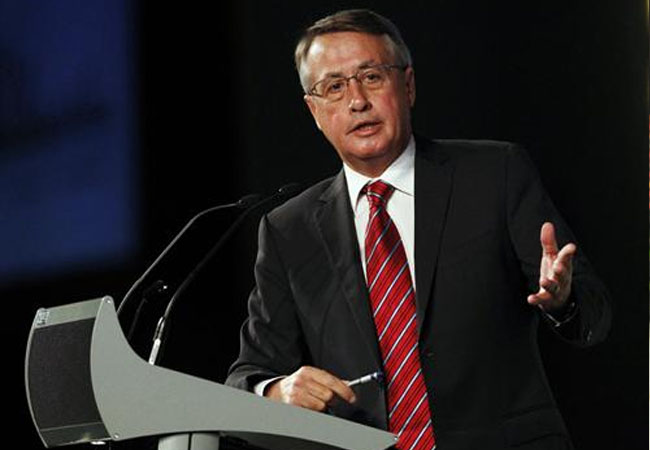
Tread carefully seems to be the consensus on banking reform, writes Eric Johnston.
IT WAS Super Wednesday for the banking industry. Through various forums, three heads of Australia’s biggest banks – including Commonwealth Bank boss Ralph Norris – pushed back on the political drive to make widespread changes to the industry.
The trio that also included ANZ boss Mike Smith and well-connected Westpac chairman Ted Evans pushed a common theme: competition is alive and as intense as ever in the banking industry. More of the proposals would do little to ease recent pressure on interest rates, while taxpayer support to drive competition would be risky, they argued.
Treasury secretary Ken Henry, the man whose department was charged with developing many of the banking reforms released by Treasurer Wayne Swan at the weekend, appeared to back these assertions.
Advertisement: Story continues below
Henry questioned whether competition had really fallen away in the mortgage market. While something clearly had changed in the home loan market as a result of the crisis, and smaller banks and others had not been able to raise funds through selling mortgage-backed securities, ”this may not necessarily mean a lessening of competition in the home loan market”, he said yesterday.
”The repricing of home loans and other lending products could simply be a response to changes in funding costs and a reassessment of risk,” he said in a speech to the Australasian Finance and Banking Conference.
His remarks come on the heels of warnings this week by the Reserve Bank and the Australian Prudential Regulation Authority to tread lightly in trying to curb the big banks. These comments, coming from top financial regulators, have added credibility to calls by the major banks to move cautiously when it comes to deliberately trying to tilt the industry’s balance of power through legislation.
The global financial crisis has already provided a brutal example of what happens when banking systems turn bad.
CBA’s Norris, appearing before the Senate banking committee yesterday, attempted to shift the focus of the banking debate from borrowers to savers, saying he made ”no excuse” for pricing appropriately for risk, particularly when it came to business lending.
”I don’t think anybody should be of the view that we don’t risk in the future another crisis in banking or finance,” Norris said.
”From my perspective, I make no excuse for being prudent. We are looking after our depositors’ money. Our depositors want to be able to come to the bank and have security of receiving that money back.”
ANZ’s Smith also told the committee that re-regulation would go against the grain of the major economic reforms of the past two decades. He characterised competition in the banking sector as ”brutal”, adding that his bank was making every effort to win new business. ”Without our customers, we’re nothing,” he said.
Meanwhile, in Sydney, Westpac’s Evans told a shareholder meeting it was critical not to undo all the work by government, regulators and banks during the financial crisis aimed at keeping the banking system strong.
Evans, a former Treasury secretary who still has the ear of many in Canberra, said governments also need to play their part in ensuring that the banking system remained a sustainable part of the Australian economy.
”Many of the ideas emerging in public debate in recent times would not serve that fundamental objective,” Evans said.





